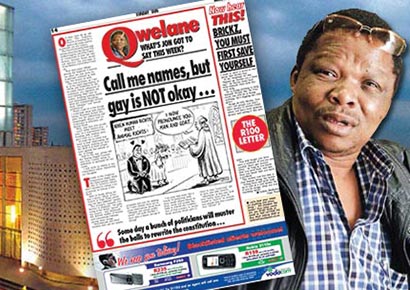Leave to appeal granted in Qwelane hate speech case
 There’s no end in sight to the Jon Qwelane homophobic hate speech case as he is given leave to appeal the August 2017 judgement against him.
There’s no end in sight to the Jon Qwelane homophobic hate speech case as he is given leave to appeal the August 2017 judgement against him.
On Friday, the high court in Johannesburg allowed the former journalist and columnist to take the matter to the Supreme Court of Appeal.
Judge Seun Moshidi said he believes that the case has reasonable prospects of being overturned on appeal, reported Times Live.
“The Equality Court proceedings (are) relatively novel in our democratic dispensation‚ and it is in the interests of justice that some level of certainty is achieved by appellate courts‚” Mosidi said.
The case, which has dragged on for almost a decade, concerns Qwelane’s infamous 2008 Sunday Sun article, Call me names, but gay is not okay.
In it he suggested that homosexuality was similar to bestiality, said he supported Robert Mugabe’s homophobia (which includes calling gays and lesbians “worse than pigs and dogs”), and urged politicians to remove the sexual orientation equality clause from the Constitution.
A cartoon alongside the article depicted a man marrying a goat in church, further enforcing the idea that same-sex relationships are akin to bestiality. The piece saw more than 350 complaints being submitted to the SA Human Rights Commission (SAHRC).
Qwelane was first found guilty of hate speech in 2011. He was ordered to apologise to the gay community and to pay damages of R100,000 towards an LGBTI rights group. That ruling was rescinded on a technicality and the case was refiled by the SAHRC.
In August last year, the South Gauteng High Court against found Qwelane guilty of hate speech in terms of Section 10 of the Equality Act. He was ordered to apologise to the LGBTI community and that the apology be published in a national Sunday newspaper. Qwelane was also ordered to pay the costs of the other parties in the proceedings.
Qwelane’s lawyers argue that the article did not incite hatred or violence against LGBT people and did not cause “actual harm”. They also believe that section 10 of the Equality Act that deals with hate speech is too vague and broad and impinges on freedom of speech.
Leave a Reply